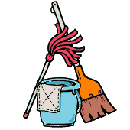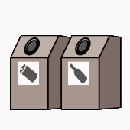
Japan apartment rental : Easy-to-search
accommodation and apartment listings for
non-Japanese speakers, covering all area in Japan
 |
1.After you move... |
||||||||||||||||||||||||
(1)Important things to do after your move |
|||||||||||||||||||||||||
1)Contact each utility office (water, gas, etc). Most offices do not employ English speaking staff, so we recommend that you ask a Japanese speaking friend for assistance. |
|||||||||||||||||||||||||
3) Open an account with a bank or register your new address with your old bank.
|
|||||||||||||||||||||||||
(2) Meeting your neighbors |
|||||||||||||||||||||||||
When you move in, it is common courtesy to greet your landlord. Especially in Japan, first impressions are very important.
|
|||||||||||||||||||||||||
When moving into a new apartment, introduce yourself to your nextdoor neighbors on both sides, and also those above and below you. When moving into a new house, you should introduce yourselves to your neighbors in the three nearest houses to your right, and the three nearest houses to your left. Traditionally, this area (three houses in any direction) was called the Muko Sangen Ryodonar. It was an organized group of neighbors who help each other in various ways.
|
|||||||||||||||||||||||||
It's best to introduce yourself to your neighbors on the day you move in. It's nice to bring a small offering or gift, such as postcards, or some sort of candy or sweets. The standard amount spent on this sort of token gift is \500~\1,000. Although gift giving in this situation is a Japanese tradition, if you fail to do it, your neighbors will probably understand considering you are a foreigner.
|
|||||||||||||||||||||||||
In case of emergency, it is your neighbors that help you most. Having a good relationship with your neighbors is important. If they like you, they are more likely to tolerate whatever you may do.
|
|||||||||||||||||||||||||
|
|||||||||||||||||||||||||
(3) Notifying friends and relatives |
|||||||||||||||||||||||||
In Japan, it is customary to notify friends and relatives of your move by sending them a greeting card with your new address and phone number. This is usually done within a month of moving.
|
|||||||||||||||||||||||||
(4)Repairs before you move in |
|||||||||||||||||||||||||
1.When You Move In
|
|||||||||||||||||||||||||
 |
|||||||||||||||||||||||||
(1)Organization |
|||||||||||||||||||||||||
Each housing complex has its own residents' association, which serves as an organization for mutual assistance among the tenants--carrying out activities to keep the environment clean, holding social events, and so on. |
|||||||||||||||||||||||||
Although membership is optional, life is easier if you become a member because the Chonaikai provides useful information on daily life and public activities. Chonaikai circulate city newsletters and plan various recreational activities. Enrollment and monthly fees vary from one chonaikai to another.
|
|||||||||||||||||||||||||
(2)Membership fees |
|||||||||||||||||||||||||
The activities of the residents' association are funded by membership fees. These are used to hold association events, purchase cleaning equipment and other necessities such as paying the electricity bill for lighting of common-use areas, and so on.
|
|||||||||||||||||||||||||
(3)Activities |
|||||||||||||||||||||||||
The association makes sure that the grounds are kept tidy, the grass trimmed, etc... Some housing complexes have a roster system for these duties. Please participate according to the rules of your local association.
|
|||||||||||||||||||||||||
When the residents' association holds a social event such as a sports meet or a cultural festival, all residents are encouraged to participate actively and become part of the local community.
|
|||||||||||||||||||||||||
Since the activities of the residents' association differ in each housing complex, you should ask your neighbors or an association officer about the rules of your local association when you move in.
|
|||||||||||||||||||||||||
 |
|||||||||||||||||||||||||
(1)Humidity |
|||||||||||||||||||||||||
Due to the relatively high humidity inside recently built housing, you should take extra care to avoid mold buildup. On sunny days it is best to air out rooms and allow the walls, closets, cupboards, etc., to dry out. |
|||||||||||||||||||||||||
(2)Condensation |
|||||||||||||||||||||||||
Heating in the winter may cause drops of water to condense on the walls and give rise to mold. Be especially careful about condensation in rooms and closets on the northern side of the building. Keep rooms well aired out, and wipe away any condensation droplets that may form with a dry cloth.
|
|||||||||||||||||||||||||
As the insides of oshi-ire are also prone to condensation, ventilate them well. During the rainy season and winter, opening both fusuma a bit at the edges helps keep an oshi-ire's interior dry.
|
|||||||||||||||||||||||||
(3)Preventing carbon monoxide poisoning |
|||||||||||||||||||||||||
When using gas or kerosene heaters, etc., always ensure adequate ventilation to prevent carbon monoxide poisoning.
|
|||||||||||||||||||||||||

|
|||||||||||||||||||||||||
No dogs, cats, or other animals are permitted, due to noise, shedding, etc., These problems tend to cause trouble with neighbors, and to create an unsanitary environment. If you'd like to keep a pet, you'll need to read the lease contract carefully and get permission from the landlord or agent to avoid any trouble. |
|||||||||||||||||||||||||
 |
|||||||||||||||||||||||||
5.Garbage
|
|||||||||||||||||||||||||
Sort your garbage into combustible and incombustible waste. Put each of these out in their designated place on the appropriate collection day. For details on collection days and methods, etc., ask your neighbors and landlord, and follow any instructions you receive from the sanitation department. |
|||||||||||||||||||||||||
If these rules are not observed, your garbage may not be collected. At some City Offices, instructions on how to dispose of garbage are available in foreign languages.
|
|||||||||||||||||||||||||
Do not leave garbage on the veranda or in other places where it might cause a nuisance to neighbors by attracting insects, giving off odors, etc.
|
|||||||||||||||||||||||||
Do not, under any circumstances, throw garbage or water from a balcony or window, in the corridors, on stairs, etc.
|
|||||||||||||||||||||||||
Don't put oversized trash items, such as furniture or electrical appliances, where you put out the daily garbage. In order to dispose of such items you must phone the waste management office and arrange for pickup. Another way to get rid of these types of items is to sell them to a secondhand shop.
|
|||||||||||||||||||||||||
 |
|||||||||||||||||||||||||
6.Noise |
|||||||||||||||||||||||||
Sound travels through a concrete building more easily than you might think.
|
|||||||||||||||||||||||||
At night, footsteps in the hallway, people going up the stairs, voices heard through open windows, and doors opening and closing sound even louder. Noise late at night in particular can disrupt your neighbor's sleep. Ensure that you do your part to maintain a quiet environment.
|
|||||||||||||||||||||||||
Remember that the sound of a child jumping up and down reverberates quite loudly in the unit below. Vacuum cleaners and washing machines tend to be quite noisy and may bother your neighbors. Try to use them between 8 o'clock in the morning and 9 o'clock at night.
|
|||||||||||||||||||||||||
Some devices for soundproofing |
|||||||||||||||||||||||||
Try spreading a carpet over a wooden floor, and wearing slippers with soft soles.
|
|||||||||||||||||||||||||
Put bookshelves or wardrobes against walls that adjoin neighboring units.
|
|||||||||||||||||||||||||
Set your TV or audio equipment away from the wall, and do not put them directly on the floor.
|
|||||||||||||||||||||||||
Cover the feet of your chairs with caps.
|
|||||||||||||||||||||||||
If you are concerned about the loud noise your closing door makes, paste polyurethane tape on the door
|
|||||||||||||||||||||||||
Try wrapping rags around drainpipes to make the sound of water flow less audiable.
|
|||||||||||||||||||||||||
Place a sound dampening mat under the washing machine. |
|||||||||||||||||||||||||